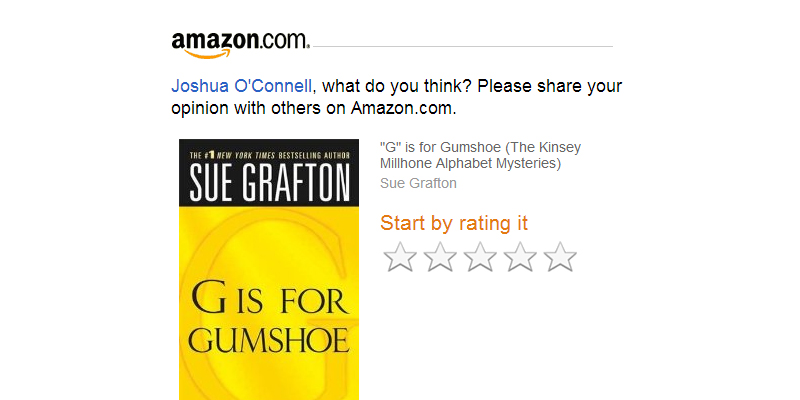
A recent Amazon promotion for Kindle books piqued my interest: They put the first 15 stories in the famous Sue Grafton series on sale for $1.99 each. Having seen them for years, and knowing they’d probably be in my wheelhouse, the investment to get going with the series was low enough to take the plunge.
This week, I got an email from Amazon asking me how I liked the seventh book in the series (and more specifically, to rate/review it). Having only just bought them a couple of weeks ago, and having purchased them with the intent I wouldn’t get through all of them for awhile (something that should be relatively obvious when 15 were put up for sale at the same time), this one baffled me. And it’s happened before.
I tend to have a queue of books ready to go, since I’m not sure what I might be in the mood for. Amazon always asks a short time after purchase, no matter what the size of the book, or whether I’ve begun reading it.
The Whispersync technology in Kindle lets the software keep track of where you are in reading a book, so if you open the book on another device, like going from a Kindle to a phone, you can keep reading. But couldn’t that same technology let Amazon know that I haven’t started reading a book yet, since no location had been saved? And instead ask me how I like the business book I’ve been reading instead, the one I bought in April?
I’m sure some would note that it’s a further intrusion of technology into our lives. But there are times when it would make the whole process a lot easier. I can’t review a book I haven’t read, but I’d be more inclined to review one I’m reading now if prompted. Sure, some people wouldn’t get this prompt if wireless is turned off, but if the Kindle’s never phoning home, there could clearly be a fallback for those people that’s less precise, but still perhaps more informed based on the reading patterns of a growing number of eBook users. It could carry over to print, based on the average length of time it takes people to get through books, based on their data.
But it seems that, even for companies like Amazon, which has proven to be incredibly clever with technical ideas in the past, there’s still more work to be done.